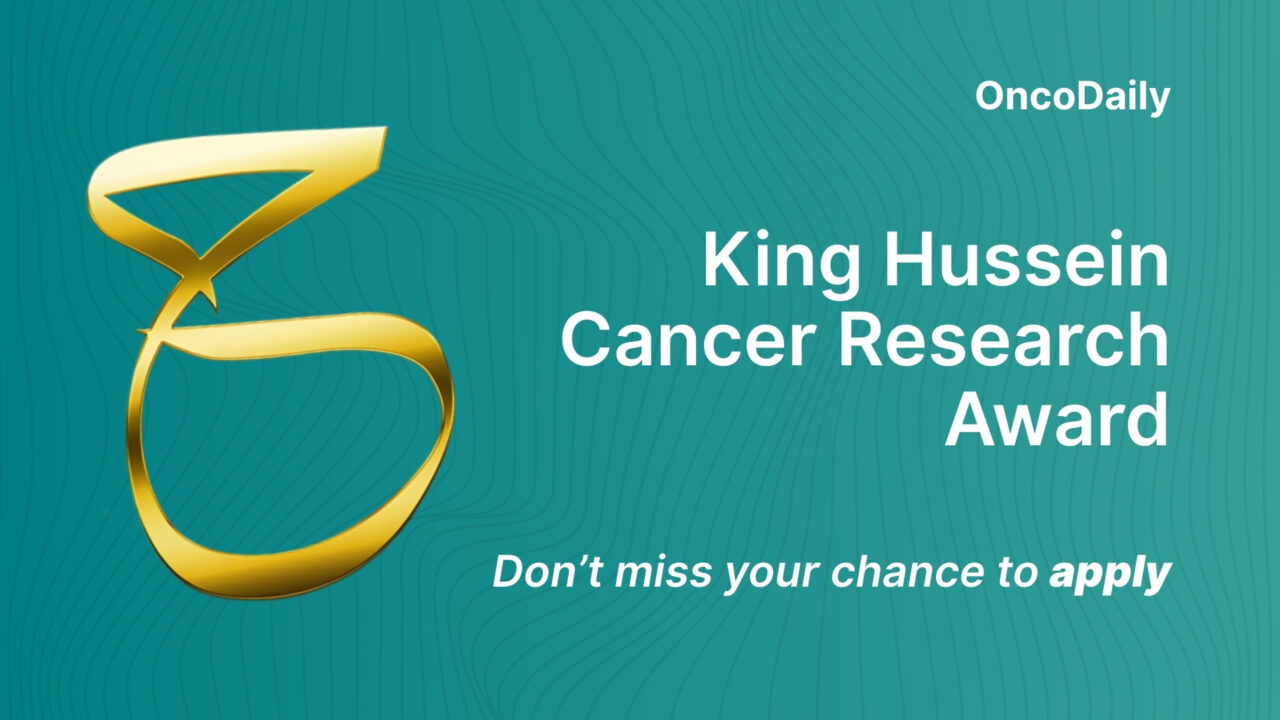The King Hussein Cancer Research Award (KHCRA) was established in 2020 to advance regionally focused cancer research and strengthen scientific capacity and collaboration across the Arab world. Named in tribute to Jordan’s late King Hussein bin Talal, a leader who championed healthcare development and bravely fought cancer himself, the Award seeks to address a longstanding gap in cancer research by supporting studies that reflect the region’s distinct epidemiological, genetic, and environmental characteristics.
Administered by the King Hussein Cancer Foundation, the KHCRA promotes excellence in oncology research through a competitive framework that identifies and supports Arab researchers demonstrating significant impact in cancer science. By fostering innovation and collaboration, the Award contributes to the development of evidence-based solutions that improve cancer outcomes and build research leadership within the region.
Since its inception, the KHCRA has engaged 794 researchers from 31 countries across its four cycles, reflecting its broad regional reach and growing prestige.
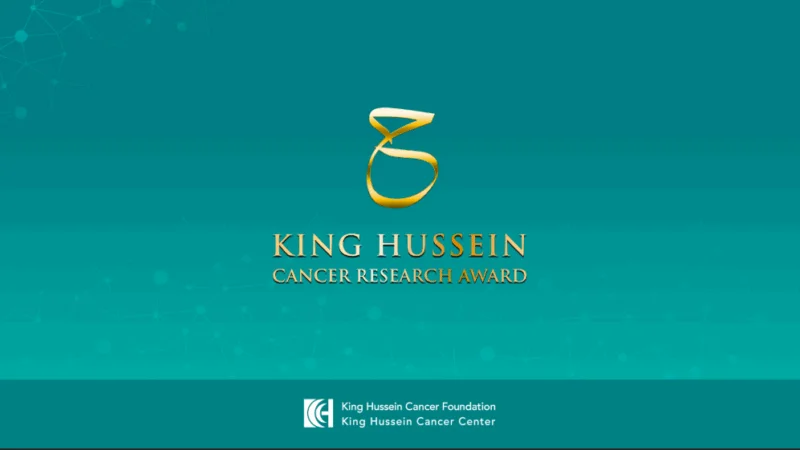
Applications for the 2025 cycle are currently open, with a submission deadline of June 15, 2025
KHCRA Categories, Key Eligibility Criteria, and Application Process
The King Hussein Cancer Research Award (KHCRA) is designed to recognize and celebrate outstanding cancer researchers of Arab origin who have made significant contributions to cancer knowledge, prevention, diagnosis, treatment, and care. The Award encourages both established and emerging scientists working in the Arab world or abroad.
Lifetime Achievement Award
This prestigious award honors researchers who have demonstrated a lifelong commitment to cancer research and have played a pivotal role in advancing regional or international cancer science.
Eligibility
- Must hold an MD, PhD, MD/PhD, or equivalent degree.
- At least 15 years of active research experience.
- Affiliated or previously affiliated with a reputable cancer research institution.
- Demonstrated significant contributions in prevention, diagnosis, or treatment of cancer.
- Proven leadership, mentorship, and collaboration in cancer research.
Tracks:
- Regional (Arab researchers working in the Arab world)
- International (Arab researchers working outside the Arab world)
Recognition:
- USD 30,000 prize
- Official Award Ceremony recognition
- King Hussein Award plaque
Can be nominated by eligible nominators or self-applied. Requirements include CV, letters of support, publication metrics, patents (if any), and a personal statement.
Promising Researcher Grant
This grant provides funding for research proposals to be conducted in the Arab world by promising young researchers, in any discipline related to cancer.
Eligibility
- Researchers aged 45 or younger. Must hold an MD or PhD.
- Reside and conduct research in the Arab world.
- Research must be innovative with potential for significant impact.
Recognition:
- Grant up to USD 100,000 each
- Official Award Ceremony recognition
Young Investigator Award
Recognizes early-career investigators for impactful and innovative cancer research contributions.
Eligibility:
- Age 45 or younger.
- MD, PhD, or equivalent degree.
- Demonstrated innovative contributions to cancer research.
Tracks:
- Regional (working in the Arab world)
- International (Arab origin working abroad)
Recognition:
- USD 20,000 prize
- Official Award Ceremony recognition
Professional Development Program for Cancer Care Excellence
This Award recognizes programs in the field of cancer which are affiliated with or hosted in a university/academic institution or in an accredited hospital or cancer center/program in the Arab world.
The Professional Development Program must demonstrate commitment to clinical research, training and education of future cancer healthcare professionals.
Nomination and Application Process
Eligible nominators must submit the nominee’s CV, their own CV, and a letter of support. Self-applications require a CV and a cover letter. After initial screening, nominees/applicants submit a full application including a personal statement, external reference letters, publication records, patents, and other achievements. Applicants must declare institutional affiliation and demonstrate a strong publication history and research impact, including metrics like H-index and citation counts.
Who Can Nominate?
Individuals with a PhD or MD and at least 15 years of active research experience, with strong publication records and institutional affiliation. Members of the Award Board or Evaluation Committees are not eligible to nominate during their term of service or within the following year.
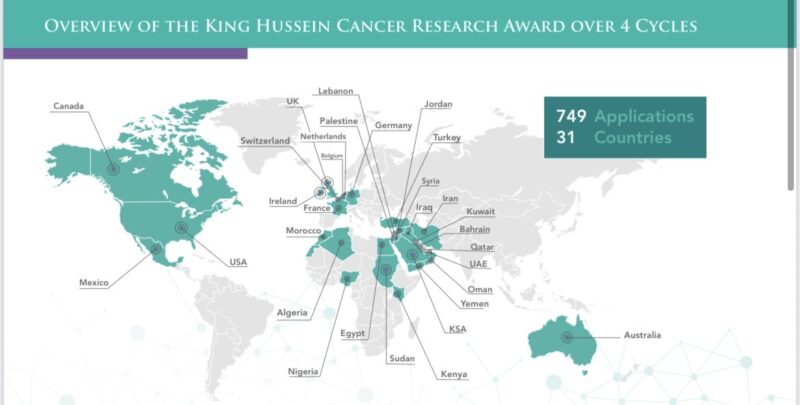
What Inspired the Creation of the King Hussein Cancer Research Award?
The Award addresses a critical gap in cancer research: historically, much of the scientific literature and clinical guidelines have been based on studies conducted outside the Arab world, often neglecting the region’s unique genetic profiles, environmental exposures, and healthcare contexts. The KHCRA aims to empower Arab scientists to generate knowledge that directly benefits their communities, reducing dependence on external data and enhancing regional self-reliance.
How Are Winners Selected for the King Hussein Cancer Research Award?
The KHCRA’s nomination process is rigorous and highly competitive. For example, the 2024 cycle attracted 272 researchers from 28 countries, reflecting the Award’s growing prestige and international reach. Nominations undergo thorough evaluation by a distinguished panel of international oncology experts, who assess scientific merit, innovation, relevance to the Arab world, and potential impact.
Awardees receive a monetary prize, a commemorative plaque, and public recognition during an official ceremony attended by dignitaries, government officials, and leaders in cancer research. The Award Ceremony serves not only as a celebration but also as a platform for networking, knowledge exchange, and fostering collaborations.
How Does the King Hussein Cancer Foundation Support Cancer Research?
The King Hussein Cancer Foundation (KHCF) was established to support KHCC’s mission by mobilizing resources, raising public awareness, and funding cancer control programs. KHCF plays a critical role in expanding access to care, supporting patient assistance programs, and financing research initiatives. Together, KHCF and KHCC form a synergistic partnership that advances cancer control in Jordan and the broader Arab region.

Research Integration and Regional Impact
Research at KHCC is closely aligned with the KHCRA’s mission. By fostering local scientific inquiry, KHCC generates data relevant to the Arab world’s cancer burden, including studies on genetic mutations prevalent in Arab populations, environmental risk factors, and culturally appropriate prevention strategies. This research has led to innovations in diagnostics, personalized therapies, and public health interventions, directly improving cancer outcomes. KHCC’s role as a regional hub for oncology research and care amplifies the Award’s impact by providing infrastructure, expertise, and mentorship to emerging scientists.
Notable Recipients
The King Hussein Cancer Research Award has become a prestigious recognition of scientific excellence, attracting a diverse array of top-tier researchers from across the Arab world and beyond. Among the international and regional awardees are world-renowned oncologists such as Dr. Toni Choueiri, Dr. Raya Saab, Prof. Mohamad Mohty, and Prof. Ali Shamseddine, whose groundbreaking work has significantly advanced cancer research and care. The 2023 and 2024 award ceremonies, held under the patronage of Princess Ghida Talal, brought together researchers, policymakers, and dignitaries to honor recipients who exemplify the Award’s mission of innovation, impact, and leadership in oncology.
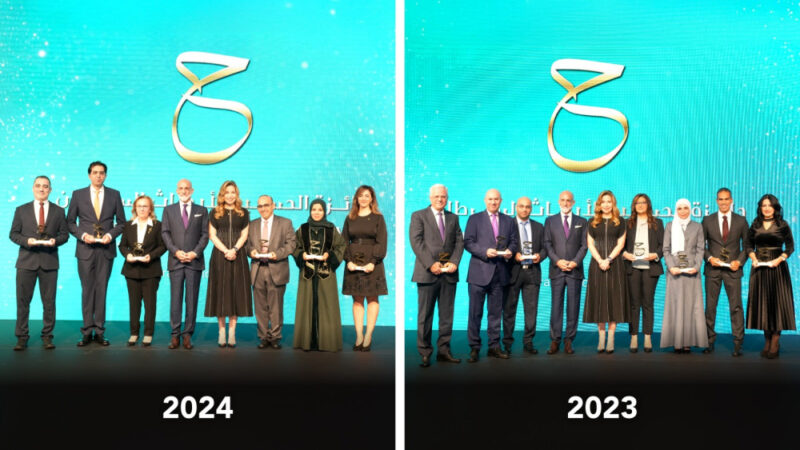
Deputizing for His Majesty King Abdullah II, HRH Prince Talal Honors 2023 and 2024 King Hussein Cancer Research Award Recipients.
2024 Recipients
Lifetime Achievement Award
Prof. Mohamad Mohty (Saint Antoine Hospital, France) – International track
Prof. Randah Hamadeh (Arabian Gulf University, Bahrain) – Regional track
Young Investigator Award
Dr. Bishoy Faltas (Weill Cornell School of Medicine, US) – International track
Dr. Mohammad Abufaraj (University of Jordan, Jordan) – Regional track
Promising Researcher Grant
Dr. Ola Sabet (Children Cancer Hospital 57357, Egypt)
Dr. Adhari Al-Zaabi (Sultan Qaboos University, Oman)
2023 Recipients
Lifetime Achievement Award
Dr. Toni Choueiri (Dana-Farber Cancer Institute, US) – International track
Prof. Ali Shamseddine (Naef K. Basile Cancer Institute, American University of Beirut, Lebanon) – Regional track
Young Investigator Award
Prof. Hatem Azim (Monterrey Institute of Technology, Mexico) – International track
Dr. Yacoub Yousef (King Hussein Cancer Center, Jordan) – Regional track
Promising Researcher Grant
Dr. Hadeel Halalsheh (King Hussein Cancer Center, Jordan)
Dr. Hiba El-Hajj (American University of Beirut, Lebanon)
Academic Program Excellence
KHCC’s Hospital Based Health Technology Assessment Program
2022 Recipients
Lifetime Achievement Award
Prof. Ali Bazarbachi (American University of Beirut) – Regional doctor
Prof. Elias Jabbour (University of Texas MD Anderson Cancer Center) – International doctor
Young Investigator Award
Dr. Ahmed Salem (Hashemite University, Jordan) – Regional doctor
Dr. Jawad Fares (Northwestern University’s McGaw Medical Center, US) – International doctor
Promising Researcher Grant
Dr. Hasan Hashem (King Hussein Cancer Center, Jordan)
Dr. Jibran Sualeh Muhammad (University of Sharjah, UAE)
Clinical Program Excellence
KHCC’s Tobacco Dependence Treatment and Tobacco Control Clinical Program, represented by Dr. Nour Obeidat
2021 Recipients
Dr. Margret Shirinian (American University of Beirut) – Promising Researcher Grant
Dr. Wafaa Ramadan (University of Sharjah) – Promising Researcher Grant
Dr. Rami Komrokji (H. Lee Moffitt Cancer Center and Research Institute, US) – Lifetime Achievement (International)
Dr. Yacoub Yousef – Promising Investigator (Research Project)
Dr. Hikmat Abdel-Razeq – Established Investigator (Research Project)
Dr. Raya Saab – Established Investigator (Research Project)
Dr. Nagi El Saghir (King Faisal Specialist Hospital and Research Centre) – Lifetime Achievement (Regional)
Dr. Mahmoud Aljurf (King Faisal Specialist Hospital and Research Centre) – Lifetime Achievement (Regional)
King Faisal Specialist Hospital and Research Centre (represented by Dr. Majid Alfayyadh) – Institutional Excellence
These Awardees represent diverse countries and specialties, reflecting the award’s broad impact. The Award ceremonies provide a platform for scientific exchange and visibility, bringing together regional and international stakeholders in oncology. Remarks from institutional leadership emphasize the importance of evidence-based research in addressing cancer burden in the Arab world.
You Can Also Watch More About the Award on OncoDaily
Impact on Regional Cancer Research and Future Outlook
The KHCRA has catalyzed a cultural shift in Arab cancer research, encouraging scientists to pursue high-impact projects tailored to regional needs. It has inspired young researchers and facilitated collaborations across institutions and countries. Award-supported research has led to improved diagnostics, personalized therapies, and public health interventions. These advances address knowledge gaps about cancer epidemiology, genetics, and treatment responses in Arab populations. Looking ahead, Princess Ghida envisions expanding the award’s scope, enhancing research infrastructure, and strengthening international partnerships. The goal is a cancer-free Arab world achieved through innovation, collaboration, and equitable care.
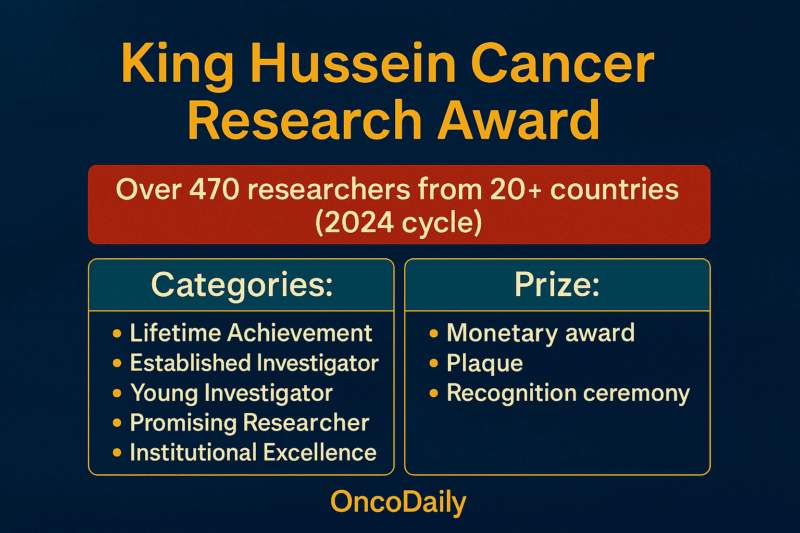
The KHCRA represents a strategic investment in regional research excellence, fostering collaboration and advancing context-specific cancer solutions. Ongoing institutional support remains critical to sustaining this momentum and expanding the program’s impact. Under Princess Ghida’s visionary leadership, KHCF and KHCC have transformed cancer care and research in Jordan and the Arab world.
For More Information You Can Visite The King Hussein Cancer Research Award Website
Written by Aharon Tsaturyan MD
FAQ
What is the King Hussein Cancer Research Award (KHCRA)?
The KHCRA is a prestigious award established in 2020 by the King Hussein Cancer Foundation to recognize and support outstanding cancer research focused on the unique needs of the Arab world.
Who is eligible to apply for the KHCRA?
Eligibility varies by category, but generally includes Arab researchers with an MD, PhD, or equivalent degree, working either in the Arab world or abroad. There are specific age and experience requirements for each category.
What are the main categories of the KHCRA?
The KHCRA includes several categories: Lifetime Achievement Award, Young Investigator Award, Promising Researcher Grant, Professional Development Program for Cancer Care Excellence
How many researchers have participated in the KHCRA so far?
Since its inception, the KHCRA has engaged 794 researchers from 31 countries across its four cycles, reflecting its wide regional and international reach.
What is the application deadline for the 2025 KHCRA cycle?
Applications for the 2025 cycle are open, with a submission deadline of June 15, 2025.
How are winners selected for the KHCRA?
Winners are chosen through a rigorous, competitive process by a panel of international oncology experts, based on scientific merit, innovation, relevance to the Arab world, and potential impact.
What are the prizes and recognition for KHCRA winners?
Winners receive monetary prizes (up to USD 100,000 for some categories), official recognition at an award ceremony, and a commemorative plaque.
Can researchers outside the Arab world apply?
Yes, Arab researchers working internationally are eligible for certain categories, such as the International tracks of the Lifetime Achievement and Young Investigator Awards.
What is the purpose and impact of the KHCRA?
The KHCRA aims to advance cancer research tailored to the Arab region’s unique epidemiological, genetic, and environmental characteristics, fostering innovation, collaboration, and leadership in oncology.
Who are some notable past recipients of the KHCRA?
Notable awardees include Dr. Toni Choueiri, Prof. Mohamad Mohty, Prof. Ali Shamseddine, and Dr. Raya Saab, among others, recognized for their significant contributions to cancer research and care.


